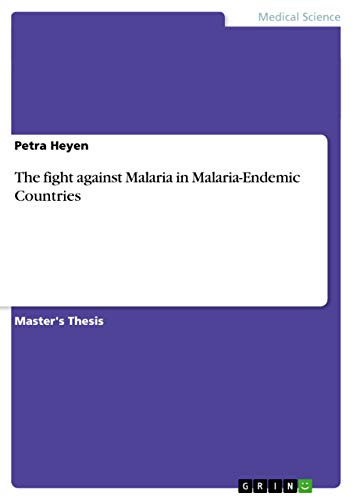Artículos relacionados a The fight against Malaria in Malaria-Endemic Countries

"Sobre este título" puede pertenecer a otra edición de este libro.
- EditorialGRIN Verlag
- Año de publicación2011
- ISBN 10 3640862597
- ISBN 13 9783640862597
- EncuadernaciónTapa blanda
- Número de edición2
- Número de páginas104
Comprar nuevo
Ver este artículo
Gastos de envío:
EUR 23,00
De Alemania a Estados Unidos de America
Los mejores resultados en AbeBooks
The fight against Malaria in Malaria-Endemic Countries
Descripción Taschenbuch. Condición: Neu. This item is printed on demand - it takes 3-4 days longer - Neuware -Master's Thesis from the year 2004 in the subject Health Science, grade: sehr gut, University of Bonn (Mathematisch-Naturwissenschaftliche Fakultät), 116 entries in the bibliography, language: English, abstract: Malaria as a disease of the poorest in the world is on the global agenda. Many different groups take efforts in order to tackle malaria. Facing the fact that mainly children and pregnant women present the biggest problems it is difficult to maintain a logical way in order to improve the malaria situation. Therefore, organization and coordination of the efforts is an area of improvement. For example, various Public Private Partnerships have partly identical missions (e.g. GAVI and MVI), and there is good reason for combining their efforts and save administrative resources.The first step in a logic chain should be to provide better diagnostic features for the correct detection of malaria with the consequence of an adequate treatment. Country surveillance programs need to be set up in order follow resistance patterns, treatment effects, demographic patterns etc. In parallel better therapeutic and preventive measures need to be developed in order to win the race against resistance of vectors as well as parasites.All these efforts need to be planned, coordinated, managed and regulated. This requests one global coordinator with an 'umbrella function' that defines rules for all partners involved and manages the cooperation. The umbrella function should sit within a non-profit organization with long-term experience in the field, in other words the UN and more precisely the WHO. Cooperating partners can be of very different origins like industry, governments, private and public foundations, NGOs, etc. Many of these organizations already exist, but their efforts are partly the same, some themes are left out the scope. Therefore, the general recommendation would be to better streamline existing initiatives, partly redefine their mission and vision and make optimal use of existing resources. 104 pp. Englisch. Nº de ref. del artículo: 9783640862597
The fight against Malaria in Malaria-Endemic Countries
Descripción Taschenbuch. Condición: Neu. Druck auf Anfrage Neuware - Printed after ordering - Master's Thesis from the year 2004 in the subject Health Science, grade: sehr gut, University of Bonn (Mathematisch-Naturwissenschaftliche Fakultät), 116 entries in the bibliography, language: English, abstract: Malaria as a disease of the poorest in the world is on the global agenda. Many different groups take efforts in order to tackle malaria. Facing the fact that mainly children and pregnant women present the biggest problems it is difficult to maintain a logical way in order to improve the malaria situation. Therefore, organization and coordination of the efforts is an area of improvement. For example, various Public Private Partnerships have partly identical missions (e.g. GAVI and MVI), and there is good reason for combining their efforts and save administrative resources.The first step in a logic chain should be to provide better diagnostic features for the correct detection of malaria with the consequence of an adequate treatment. Country surveillance programs need to be set up in order follow resistance patterns, treatment effects, demographic patterns etc. In parallel better therapeutic and preventive measures need to be developed in order to win the race against resistance of vectors as well as parasites.All these efforts need to be planned, coordinated, managed and regulated. This requests one global coordinator with an 'umbrella function' that defines rules for all partners involved and manages the cooperation. The umbrella function should sit within a non-profit organization with long-term experience in the field, in other words the UN and more precisely the WHO. Cooperating partners can be of very different origins like industry, governments, private and public foundations, NGOs, etc. Many of these organizations already exist, but their efforts are partly the same, some themes are left out the scope. Therefore, the general recommendation would be to better streamline existing initiatives, partly redefine their mission and vision and make optimal use of existing resources. Nº de ref. del artículo: 9783640862597

